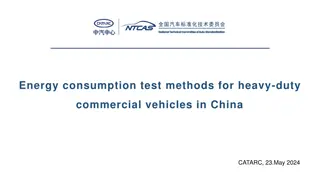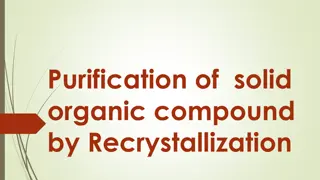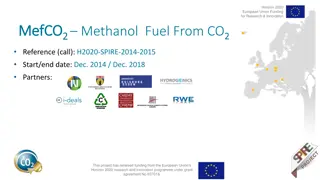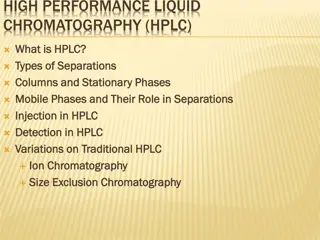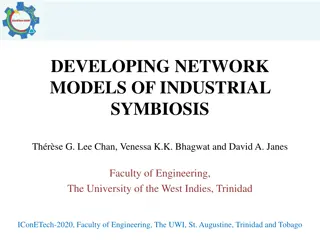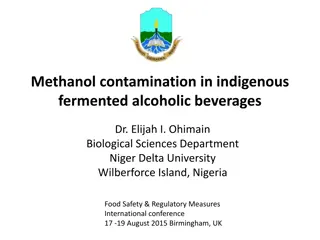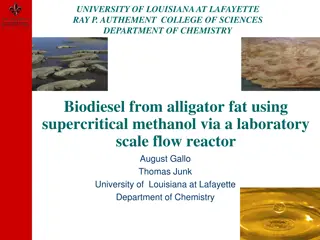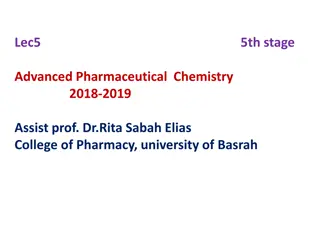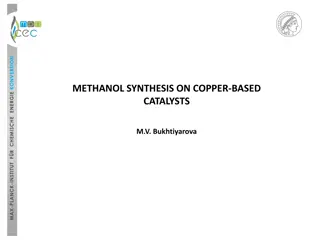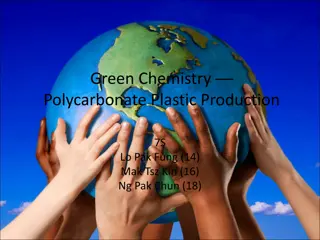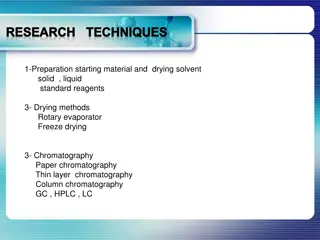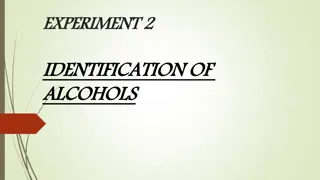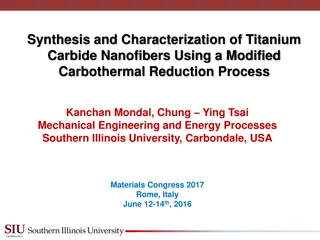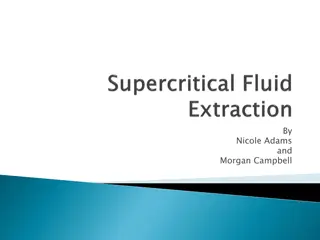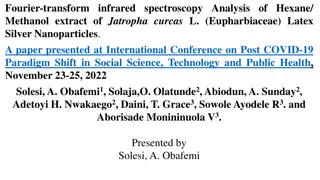Energy Consumption Test Methods for Heavy-Duty Commercial Vehicles in China
China has released energy consumption testing methods for various types of fuel vehicles, including traditional fuel vehicles, hybrid electric vehicles, battery electric vehicles, fuel cell vehicles, natural gas vehicles, and methanol vehicles. The standards cover test methods for fuel consumption a
4 views • 15 slides
Recrystallization for Solid Organic Compound Purification
Recrystallization is a laboratory technique used to purify solids based on their different solubilities. It involves dissolving an impure solid in a suitable solvent, cooling the solution to allow pure crystals to form, filtering to isolate the purified solid, and drying it. Finding a good recrystal
1 views • 11 slides
GH2 Hydrogen Namibia Stakeholders Conference: Exploring By-Products and Market Opportunities
The GH2 Hydrogen Namibia Stakeholders Conference delves into the potential of GH2 technology as a disruptive innovation, creating new industries and opportunities. Discussions revolve around GH2 by-products like ammonia and methanol, exploring their domestic and foreign market applications. Collabor
0 views • 6 slides
Horizon 2020 MefCO2 Methanol Fuel From CO2 Project Sustainability Impacts
The Horizon 2020 MefCO2 project focuses on producing methanol fuel from CO2, aiming to reduce CO2 emissions significantly and achieve renewable energy goals. The project aims to displace fossil fuels with green chemicals and advanced fuel production, providing solutions for energy storage and grid s
1 views • 6 slides
An Overview of High Performance Liquid Chromatography (HPLC)
High Performance Liquid Chromatography (HPLC) is a powerful analytical technique used for separating and identifying compounds in a mixture. It involves a mobile phase and a stationary phase to achieve separation based on different physicochemical properties. The mobile phase plays a crucial role in
0 views • 20 slides
Developing Network Models of Industrial Symbiosis - A Comprehensive Overview
Exploring the concept of Industrial Symbiosis (IS) and its significance in waste management solutions through physical material exchange and collaboration. The possibilities and linkages in CO2 network allocation and input-output analyses for Ammonia and Methanol plants are discussed, shedding light
0 views • 19 slides
Methanol Contamination in Indigenous Fermented Alcoholic Beverages: Impacts and Regulatory Measures
Indigenous fermented alcoholic beverages are facing methanol contamination issues, leading to severe health consequences and fatalities worldwide. This article highlights the concerning incidences of methanol poisoning, symptoms, and regulatory limits in various countries. The informal production of
13 views • 27 slides
Biodiesel Production from Alligator Fat: Sustainable Fuel Solution
Biodiesel production from waste alligator fat offers a sustainable solution for energy security and environmental benefits. Louisiana's abundant alligator population provides a source for biofuel production, reducing reliance on fossil fuels. The process involves converting animal fats into biodiese
0 views • 25 slides
Understanding Solvents in NMR Spectroscopy
Solvents play a crucial role in NMR spectroscopy, with characteristics like chemical inertness and lack of hydrogen atoms being key. Deuterated solvents are commonly used, but even they may show peaks due to impurities. Different deuterated solvents have varying chemical shifts and multiplicities fo
0 views • 15 slides
Understanding Methanol Metabolism and Blood Levels
This content discusses the difference between background/endogenous and exogenous methanol, how metabolism of endogenous methanol affects exogenous metabolism, and the impact of exposure to different levels of methanol on blood concentrations. It highlights EPA PBPK models and assumptions regarding
0 views • 16 slides
Methanol Synthesis on Copper-Based Catalysts at Max Planck Institut
Methanol production using synthesis gas, studying CO2 hydrogenation for reduced CO2 emissions, and utilizing methanol as a hydrogen storage method are key areas of focus at the Max Planck Institut for Chemical Energy Conversion. The process involves methanol synthesis from CO2 and H2, with experimen
0 views • 19 slides
Innovative Green Chemistry Approach in Polycarbonate Plastic Production
Revolutionizing the production of polycarbonate plastic, this innovative green chemistry approach compares traditional and greener methods. Highlighting the properties and uses of polycarbonate, it delves into its applications in electronics, construction, data storage, automotive, medical field, an
0 views • 27 slides
Essential Techniques in Chemical Research
Learn about key research techniques in chemistry including preparation methods, drying techniques, chromatography, spectroscopic techniques, and specific solvents used. Understand the importance of starting material preparation, drying reagents such as calcium chloride and molecular sieves, and how
0 views • 15 slides
Understanding Alcohols: Classification, Nomenclature, and Uses
Alcohols are organic compounds with an -OH functional group attached to a carbon atom. They are classified as primary, secondary, or tertiary based on the carbon the -OH group is bonded to. The IUPAC nomenclature for alcohols involves changing the ending of an alkane to -ol. Alcohols like methanol,
0 views • 11 slides
Synthesis and Characterization of Titanium Carbide Nanofibers using Modified Carbothermal Reduction Process
Titanium carbide nanofibers were synthesized and characterized using a modified carbothermal reduction process. The process involved the use of ethanol/methanol mixture, polyvinyl-pyrrolidone, HNO3, and titanium isopropoxide. Various techniques were employed to achieve the desired nanofiber morpholo
0 views • 16 slides
Supercritical Fluid Chromatography: History, Principles, and Applications
Supercritical Fluid Chromatography (SFC) has a rich history dating back to the 1960s, utilizing supercritical CO2 as a mobile phase for chromatographic separations. SFC offers advantages such as high efficiency, chiral separations, and green chemistry applications. Despite being overshadowed by HPLC
0 views • 27 slides
Fourier-transform Infrared Spectroscopy Analysis of Jatropha curcas Latex Silver Nanoparticles
Utilizing Fourier-transform infrared spectroscopy, this paper discusses the analysis of hexane/methanol extracts of Jatropha curcas latex silver nanoparticles. The study explores the biosynthesis of nanoparticles using plant secondary metabolites as reducing agents, highlighting the medicinal proper
0 views • 15 slides
